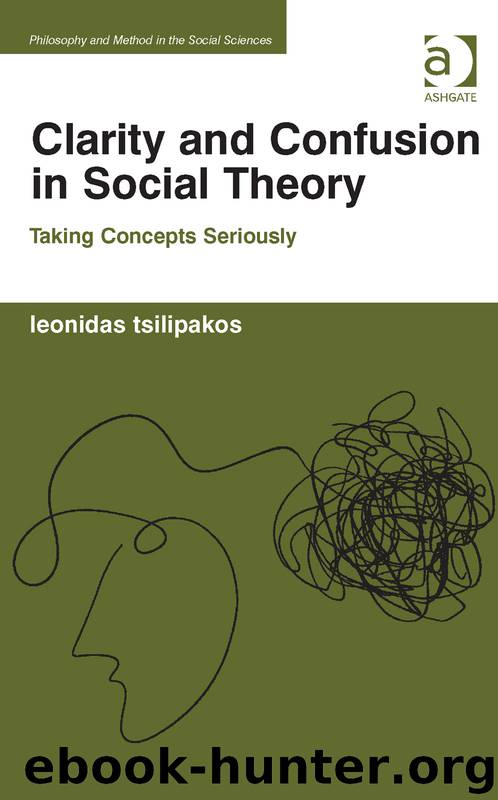Clarity and Confusion in Social Theory by Tsilipakos Leonidas

Author:Tsilipakos, Leonidas
Language: eng
Format: epub
Publisher: Ashgate Publishing Ltd
Published: 2015-03-14T16:00:00+00:00
4.6 A Distortive Picture of Language (and Explanation)
In this section I confront the idea that there is something wrong (i.e. ontologically unsound) in some way or other with talking about classes, structures, capitalism, groups, society or with employing a host of other expressions that are used in the description and explanation of social affairs. For given the above characterisations it seems that to speak about ‘changing the economy’ or someone acting in a certain way ‘because they are middle class’ (or to use concepts Elder-Vass [2006] lists such as discourse, the state, institutions, values, money, etc.) is to speak in a special kind of way, to speak tongue-in-cheek, or to speak loosely or rhetorically. However, the fact that to speak about those things is not in any way extraordinary and that as speakers of the language we usually understand what is being said when people make use of these expressions should give us pause for thought, especially when it is claimed that these expressions are somehow inadequate. It must be remembered, if only because it is all too easily forgotten, that these expressions are not sociological inventions (see Rose [1960] for evidence that sociology is through and through dependent on common terms), that is to say they are not technical terms, but form part of the vernacular that (usually) both sociologists and other members of the society speak.
To state my objection bluntly, there is nothing loose about these ways of speaking, nor are they a mere façon de parler. They only become one given a certain picture of how language relates to ‘what is out there’, a picture which is foisted upon us by the idea that we must think ontologically. If we accept that we must do so, then we are likely to presuppose that picture, as can be witnessed in the following exemplary passage where Archer is attempting to establish ontology as an inescapable concern:
Since theories are propositions containing concepts and since all concepts have their referents (pick out features held to belong to social reality), then there can be no social theory without an accompanying social ontology (implicit or explicit). (Archer 1995: 12)
Now, this is strongly reminiscent, although in an oblique way, of the idea in early analytic philosophy (adhered to by Bertrand Russell and other philosophers) of a logically proper language, that is, an ideal language in which referring expressions would have a distinctive logical structure, and be meaningful by virtue of the fact that they refer to the entities that populate ultimate reality. It is clear that Archer is not talking about any ideal language; instead, she can only have in mind the ordinary concepts that comprise the natural language sociologists speak. But her conception of a natural language is dangerously close to Russell’s. John Cook both illuminates and rebuts the implications for natural language that the ideal of a logically proper language carries in his superb article on the fate of OLP (1980). Cook dubs the misconception at work the ‘picture of language as
Download
This site does not store any files on its server. We only index and link to content provided by other sites. Please contact the content providers to delete copyright contents if any and email us, we'll remove relevant links or contents immediately.
| Anthropology | Archaeology |
| Philosophy | Politics & Government |
| Social Sciences | Sociology |
| Women's Studies |
The remains of the day by Kazuo Ishiguro(8961)
Tools of Titans by Timothy Ferriss(8357)
Giovanni's Room by James Baldwin(7313)
The Black Swan by Nassim Nicholas Taleb(7097)
Inner Engineering: A Yogi's Guide to Joy by Sadhguru(6780)
The Way of Zen by Alan W. Watts(6589)
Asking the Right Questions: A Guide to Critical Thinking by M. Neil Browne & Stuart M. Keeley(5747)
The Power of Now: A Guide to Spiritual Enlightenment by Eckhart Tolle(5740)
The Six Wives Of Henry VIII (WOMEN IN HISTORY) by Fraser Antonia(5493)
Astrophysics for People in a Hurry by Neil DeGrasse Tyson(5172)
Housekeeping by Marilynne Robinson(4430)
12 Rules for Life by Jordan B. Peterson(4298)
Double Down (Diary of a Wimpy Kid Book 11) by Jeff Kinney(4257)
The Ethical Slut by Janet W. Hardy(4235)
Skin in the Game by Nassim Nicholas Taleb(4231)
Ikigai by Héctor García & Francesc Miralles(4228)
The Art of Happiness by The Dalai Lama(4118)
Skin in the Game: Hidden Asymmetries in Daily Life by Nassim Nicholas Taleb(3985)
Walking by Henry David Thoreau(3948)
